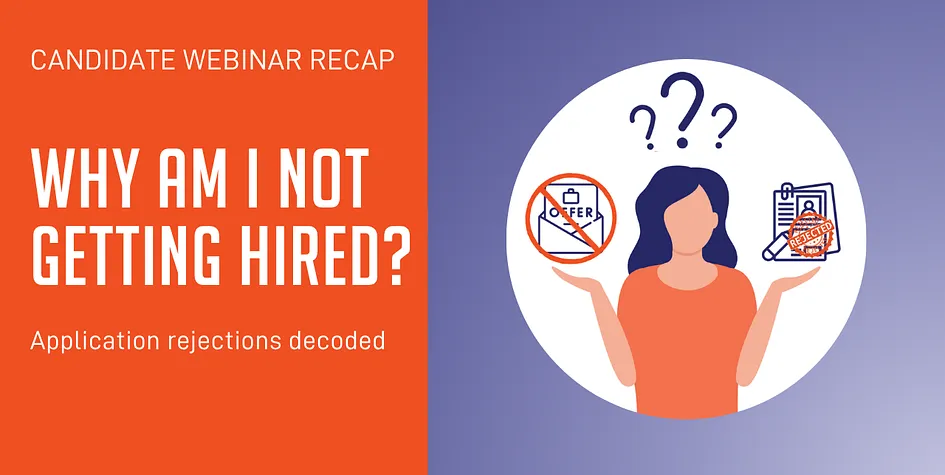Want some help figuring out your Dutch life and career? Check out our downloadable resources for more information about living and working in the Netherlands.
Why Am I Not Getting Hired? Application Rejections Decoded

If your applications aren’t getting the responses you hope for or interviews feel just out of reach, don’t worry—you are not alone! Navigating the job market can be a frustrating experience, especially when your inbox seems like it is only filled with endless rejections. While it almost always requires multiple applications (and a lot of no answers) before you end up landing your new position, there are some things you can do to avoid common application pitfalls and set yourself up for success.
In our most recent candidate webinar we shared the inside scoop on why your applications might not be making it to the final round, along with industry insights to help you decode which aspects of your application could be getting in your way and tips for how to fix them.
For all the details you can check out the webinar recording here, or keep reading to jump into the highlights.
Understanding Why Applications Get Rejected
Hiring managers and recruiters make decisions based on a variety of factors. Some of them have to do with the hard skills and experience on your CV and application. Others can be related to skills you have that are not visible on the page, and still others to the personality and communication match they see (or don’t see) between you and the company. They look at the whole picture and not just the qualifications on your resume. Therefore, even a well-qualified candidate may still face rejections due to poor application strategy, a mismatch with job requirements, or weak communication during the application and interviews. Recognizing where the breakdown occurs is the first step toward updating your strategy and fixing avoidable pitfalls for more success in the future.
Common Pitfalls in the Early Application Phase
In the early application phase, your first impression matters. The only thing the hiring team has to go off of at this stage is the information you provide and your communication surrounding your application, so it is important to get this step right.
Let’s take a look at some application mistakes that our recruiters see often, along with some tips for how to avoid them.
1. Overlooking Job Requirements and Practical Details
One of the most frequent mistakes we see is when candidates apply for jobs without fully reviewing and understanding the essential requirements. This usually includes ignoring points related to the role, like necessary language skills or required certifications, or practical details such as commuting distance or salary. We know that looking for a new position takes a lot of time, but unfortunately many applicants skip too quickly or carelessly through the job description and apply to roles they are not eligible for, leading to automatic rejections.
We have often seen that this frustration with the job search can lead to taking a quantity over quality approach at times. Unfortunately though, just throwing your CV at a job ad without making sure it is a match is not only a waste of time, it can also make a bad impression on the very recruiters you are trying to impress.
What to do instead:
- Read the job description thoroughly.
- Make note of “must-haves” in the job description and make sure your experience with them is clear on your CV or motivation letter.
- Aim for a 70–80% match with the requirements, especially regarding skills, location, language fluency, and the “must-haves”.
- Not hitting the 70-80% match, but still think it could fit? If you have reviewed the posting carefully and you still think it matches your experience and ambitions, contact the recruiter to check on the requirements you are missing and ask about the possibilities.
2. Not Tailoring your CV
While preparing a generic CV ahead of time so that you are ready to go when the right position comes along is a great plan, you do not want to forget to tailor it for the role you are applying for. A CV that works for everything will be much weaker in highlighting the relevant skills you have that align with a specific position.
If you do not take the time to make some adjustments you will be missing the chance to put more emphasis on your relevant experience, and will be missing keywords from the job description that can help your CV stand out. This lack of customization can often cause your CV to be filtered out by applicant tracking systems (ATS) looking for exact matches, or dismissed by recruiters who review hundreds of application per day and do not see the relevant information shown quickly or clearly enough on your CV.
What to do instead:
- Tailor your CV for each role. For example, include key terms and skills from the job description or add extra bullet points to elaborate on your most relevant experience.
- Use formatting and structure that are clear and suit the role type. For instance, sales resumes should emphasize metrics and achievements, while CVs for graphic design positions may be more creative and showcase your use of shapes and colors.
- Keep it concise and easy to review. You want the recruiter to want to know more and to be able to see that you are a match within the first 30 seconds, so the most important information should be easy to find.
3. Incomplete Profile Information
Your application isn't just your CV. Recruiters also rely on your candidate portal profile or application form to assess whether you will be a match for the role or not. If what you have submitted is incomplete, incorrect, or vague then they will have a much harder time determining if you are a fit or not. Missing details such as your location, work authorization, contact information, or previous job experience can put a wrench in your candidacy. Even if you are qualified, if you have left out important details, you might just miss out to a candidate whose profile was complete.
What to do instead:
- Your profile and CV are the first impression you get to make on a recruiter or hiring manager, so treat them both with care.
- Complete all the fields in your online profile or application forms. Recruiters like to have all the information they can to assess your application.
- If you are applying from abroad include a clear explanation of your relocation plans, visa status, and timelines. For example, “Relocating to Amsterdam in August 2025 with partner visa approval in process.”
- If there is anything about your situation that requires further explanation, make sure to include this somewhere in your application. For example if you are applying from abroad include a clear explanation of your relocation plans, visa status, and timelines (i.e. "Relocating to Amsterdam in August of 2025 with partner visa approval in process.")
- Update your information regularly and keep your CV and online profile consistent.
Mistakes in the Later Application Phase
Once you make it past the initial screening, there are still a few steps to go before you reach the finish line. At this point interviews and communication between you and the hiring team become the most critical parts of the process. Unfortunately, we see that candidates are often rejected in this later phase for reasons that are actually within their control. Luckily, that also means there things you can do to improve your chances.
Here are some things to watch out for as you get closer to the end of your application cycle:
1. Lack of Preparation
We know that there is a lot to think about when you are headed to a job interview and that Interviews can be intimidating and nerve-racking. That’s why preparation, while often underrated, is so important. This includes not only being prepared to explain about your own experience well, but also learning about the company and the role beforehand.
Employers expect applicants to have a basic understanding of the organization's mission, values, industry presence, and how the role they applied for will make an impact. Candidates who do not take the time to research the company, review the job description, and prepare educated questions often appear unprepared or disinterested, which does not come across well to the hiring manager.
What to do instead:
- Visit the company’s website and LinkedIn page to get a better idea of their brand, culture, products, and goals. You can also read recent news articles related to the company or industry to help you better understand the climate within the sector and the initiatives the business is working towards.
- Review your own CV and be ready to discuss how your experience aligns with the company's goals and culture.
- Go over how you would like to introduce yourself, practice responses to common questions, and make sure you know how to back up what is listed on your CV with clear examples that demonstrate your skills.
- Practice with a friend or recruiter to get out your nerves and refine your responses.
- Prepare questions that demonstrate curiosity and engagement, such as, “What do you enjoy most about working here?” or “What does success look like in this role?”
2. Poor Interview Performance
Even strong candidates can fall short if they are unable to put their best foot forward or communicate well during the interview. Being late, not dressed appropriately, or not making eye contact can have an impact on the impression you make during an interview. Communication during an interview is also very important. Answers that are too long-winded and lack clarity can be confusing for the interviewer. Only providing yes or no answers can also be frustrating for an interviewer and leave them with too many question marks at the end of the meeting. Another red flag for recruiters is when candidates do not show interest and ask questions about the role or company. Interviews are a two-way process and they want to see that you are invested in the process and genuinely motivated to become a part of their team.
What to do instead:
- Be punctual. It can help to plan your route ahead of time to ensure that you can arrive in plenty of time. This will make a good impression and allow you to enter the interview calmly and confidently.
- Answer questions clearly. Include relevant information and examples, but don’t go on for too long without giving the interviewer a chance to respond or ask follow-up questions. Use the “Goldilocks method”: not too short, not too long, just right.
- Ask genuine questions. It can be helpful to prepare a few strategic questions in advance that will reflect your curiosity about the team, company culture, expectations for the role, and upcoming projects.
- Maintain appropriate eye contact, and don’t be afraid to smile and present yourself with confidence.
- On a cultural note: Be honest and genuine. Dutch employers often value directness, clarity, and authenticity, so there is no need to oversell or pretend to be someone you’re not.
3. Lack of Professionalism
From sending in your application to signing an employment contract you will be communicating a lot along the way. Small actions can significantly impact how you come across. Missing appointments, not answering or returning calls, or showing up late can be evidence against your reliability or signify to the recruiter that you do not respect their time or are not sufficiently motivated.
Using overly casual or aggressive language may also demonstrate a lack of professionalism. When candidates have been applying for a long time and rejection after rejection comes we know it can be frustrating. In this case, it is even more important to keep up your professionalism. Showing resilience and respect, rather than aggression and anger, in a difficult situation can win points with recruiters and help move you towards success.
What to do instead:
- Understand the process. Remember that recruiters are people too and they are often reviewing hundreds of applications every day. Learn what is expected of you and what you can expect from them to promote smooth communication.
- Respond in a timely and professional manner to phone calls and messages. Even a polite “no thank you” to an interview request leaves a positive impression.
- Keep everyone informed. If something changes in your situation let the recruiter know so that they can adjust in time.
- Confirm interview details ahead of time and dress appropriately for all meetings (even for video calls).
- Keep in mind that communication styles and expectations can differ widely between cultures. Seek to understand the expectations so that you can get your point across in a way that the other person will appreciate and understand.
- Follow up, but politely. It can be helpful to thank the interviewer for their time and express your continued interest in the position. Don’t overdo it, but give them a chance to see your enthusiasm and gratitude.
- Respond to rejection with grace. You can’t win them all, so don’t burn your bridges when you don’t land the role. You never know when your professional response to a “no” can build your network for a later “yes.”
Special Note: When It’s Out of Your Hands
Not all rejections are a result of mistakes, unfortunately it is just out of your hands sometimes. The competition may have simply been too strong, or they decided to promote an internal candidate instead. A company’s choice to not hire you may also be influenced by factors completely out of your control, such as a hiring freeze or change in the economy. Don’t let this discourage you. While it sounds like bad news, if this is your reason for not getting hired you were probably on the right track, so keep going!
To keep up your momentum, it can help to reflect on your experience in this application round and determine what went well and what you might do differently next time. If you get a chance to request feedback we certainly recommend asking for insight into the interviewer’s impressions and decision making as well. Remember, no interview is wasted. Every application helps you practice and improve, and every rejection can be used as a learning opportunity.
Application Tips Summary
We have covered a lot in this article so let’s break it down to a few key tips you can use when you get ready for your next application:
- Read the job description carefully and only apply when there’s a strong match.
- Tailor your CV and motivation letter to each role using keywords and relevant examples.
- Complete your profile and clarify your situation when it comes to relocation plans, visa status, and availability.
- Prepare thoroughly for interviews, including researching the company, practicing structured answers, and preparing thoughtful questions.
- Be confident at interviews by putting your best foot forward, communicating clearly, and being yourself.
- Communicate professionally at every stage, from application to post-interview follow-ups.
- Handle rejections with grace, as your response can leave a lasting impression and keep the door open for future opportunities.
Final Thoughts
Every stage of the hiring process is an opportunity to stand out, not just with your experience, but with your preparation, professionalism, and mindset. Even a rejection can have a valuable place in helping you improve, grow your network, and find greater career success.
The job market can be challenging and frustrating at times, but better understanding these common reasons behind application rejections will help you know what to watch out for. We hope that as you follow the tips from our experts for avoiding application pitfalls that you will be able to gain more confidence and increase your chances of landing not just any job, but the right job!
This is a recap of our candidate webinar, ”Why Am I Not Getting Hired? Application rejections decoded”. You can review information included in the blog and more by rewatching the full session on our YouTube channel. Enjoy!

Find out more with our downloadable resources

Looking for a job?
Undutchables offers a variety of vacancies. Check out the latest job offers and apply.
We look forward to your application.

